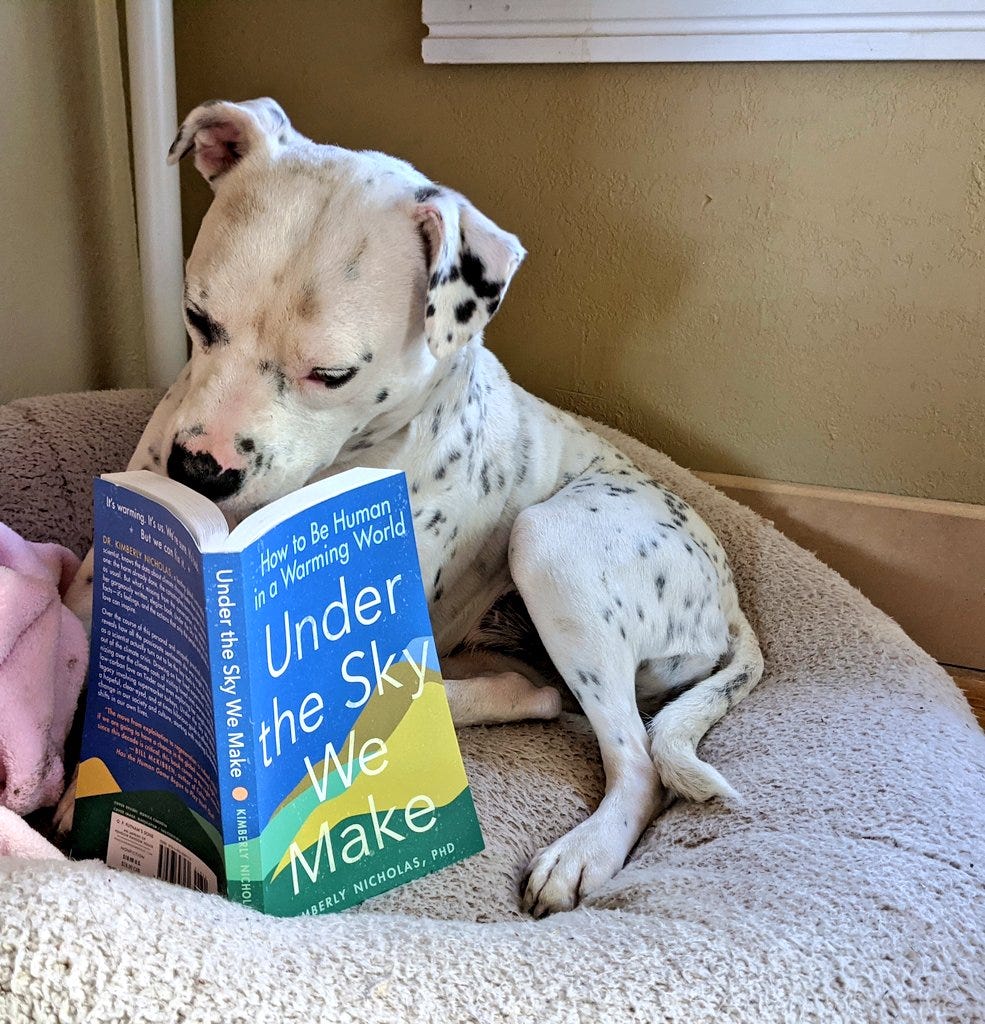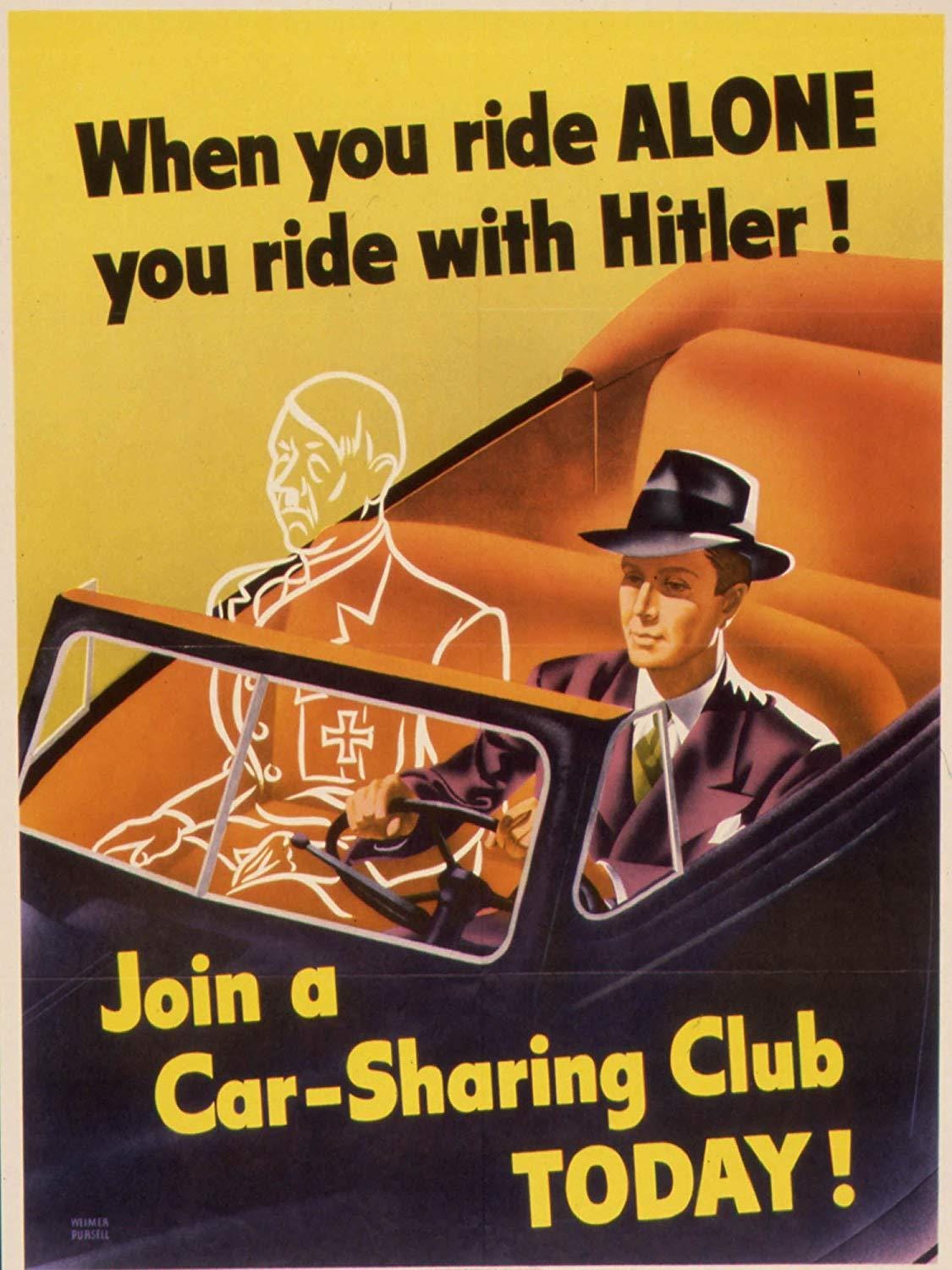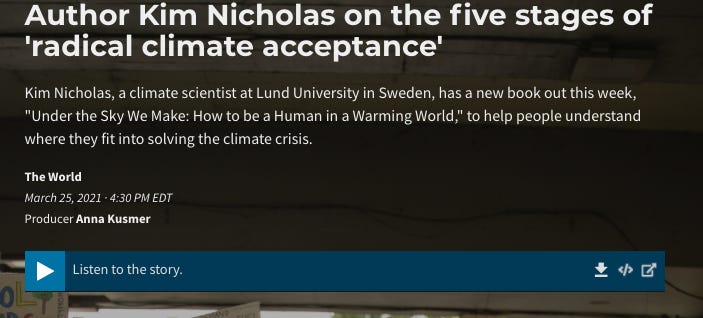People Lie About Why They Drive
Info + carrots don't get people out of their cars; scientists, use your hearts + brains; pick up the phone; please buy my new book!
Welcome back friends! Thank you all for being here to fix the climate crisis with facts, feelings, and action.
Speaking of fixing the climate crisis with facts, feelings, and action… I just published a whole book, Under the Sky We Make, on exactly that! Please buy it from your local bookstore or find it online here, and read it, and put it into practice. Thank you!

And pretty please, send me pictures of your pets reading my book!! Thank you Becca for this wonderful pic of Ruthie! <3
OK, shameless self-promotion [temporarily] over, let’s dive in!
Facts: Shoves, Not Nudges, Change Behavior
Do you ever read a peer-reviewed study that you love so much that you highlight over half the text and exclaim out loud while reading it? Or is that just me?
In any case, that was my response to this recent study showing nudging was astoundingly ineffective to reduce driving. A bunch of #ClimateTwitter also got fired up about it.
Nudging is the idea that you can change behavior to be healthier/more eco/smarter simply by changing the decision environment, without imposing costs or requirements. For example, putting the healthiest option first in a buffet is a nudge. Banning junk food is not.
Nudging holds tantalizing promise for politicians dreaming of achieving their policy goals without pissing off constituents. For example, one study found $1 spent on nudging people to increase retirement savings offered a $100 return.
But, reality check: Ariella Kristal and Ashley Whillans from Harvard Business School found nudges were completely ineffective in changing a high-polluting behavior in the real world. Womp-womp! :/
The researchers wanted to nudge people out of driving to alone to work. So they designed experiments to give employees what they said they wanted to get them out of their cars, like info on carpooling, or cheaper transit.
But then those fickle people didn’t actually make any changes!
For example:
Nearly 15,000 employees got a letter encouraging them to sign up for their employer’s existing carpool matching service. Thirty-three signed up. A month later, there were 3 new users. :(
“Less than 1.5% of employees actually shifted their behavior when given a free bus trial or notified of subsidized bus passes.”
The researchers conclude:
“There was clearly a mismatch between what employees said they wanted and what they were able or willing to do… people’s stated barriers and future plans about their commuting behaviours may not reflect their true intentions.”
That is, people tell white lies. They might actually drive because they think their car is sexy and powerful (an image this ad, banned in France, cleverly undermines). Maybe they avoid carpooling because they don’t want to talk to people they don’t know.
In an environment where infrastructure, financial incentives, and social expectations favor driving alone to work, nudges are not enough.
What would work?
The authors conclude:
“Of course, employees do not like organizations restricting choices, or taking away benefits like parking. But the long-term health and happiness of employees, and the planet, could fundamentally depend on it.”
They suggest better approaches to reduce driving:
Make the full cost of driving obvious. In the study, parking worth thousands of dollars a year was subsidized (provided for free). Either charge for parking, or pay employees a bonus equivalent to the cost of parking (and hope they choose to take the bus, and spend the cash on something more fun than parking.)
Use both carrots and sticks. Simultaneously make driving alone harder (smaller, more distant parking lots for those who drive alone), while making it easier to walk, bike, and take transit.
Change defaults. For example, only allow each employee to park at work 3 days per week, or allow remote work to reduce commutes. Help relocate employees closer to work and transit, to make it easier not to drive (“location-efficient mortgage schemes”).
Nudge strategically. Nudges work better for one-time behaviors, like getting a flu shot. For daily habits, they’re more effective during moments of change, like moving, starting a new job, or during a serious disruption. (So, implementing smart policies now could shift behavior post-pandemic.)

Feelings: Nerds need them too
This week, I was thrilled to have an excerpt from my writing in Under the Sky We Make featured in The Guardian. I’ve shared a small taste below; please check out the full passage here. <3
“Over the course of my career, the climate crisis has changed from something only experts could see – reading clues trapped in frozen air bubbles or statistical patterns in long-term data sets – to something that everyone on Earth is living through. For me, it has gone from being something I study to a way that I see the world and experience my life. It’s one thing to publish a study on the hypothetical impact of increasing temperature on California’s people and ecosystems; it’s another to feel my stomach gripped by fear as my parents flee a catastrophic California wildfire cranked up by longer, hotter, drier summers.
Bearing witness to the demise or death of what we love has started to look an awful lot like the job description for an environmental scientist these days. Over dinner, my colleague Ola Olsson matter‑of‑factly summed up his career: “Half the wildlife in Africa has died on my watch.” He studied biodiversity because he loved animals and wanted to understand and protect them. Instead his career has turned into a decades-long funeral…
My dispassionate training has not prepared me for the increasingly frequent emotional crises of climate change. What do I tell the student who chokes up in my office when she reads that 90% of the seagrasses she’s trying to design policies to protect are slated to be killed by warming before she retires? In such cases, facts are cold comfort. The skill I’ve had to cultivate on my own is to find the appropriate bedside manner as a doctor to a feverish planet; to try to go beyond probabilities and scenarios, to acknowledge what is important and grieve for what is being lost…
It has taken me a long time to come to terms with my climate and ecological grief, but swimming through it is the only way forward. One role environmental scientists can play is to be “stewards of grief, to hold the hand of society as we enter the unknown space of the climate crisis,” as my friend Leehi Yona so beautifully wrote when the IPCC’s 1.5C report launched. As scientists, we have had much more time observing the decline of what we love. We are further down the line of where we all must get to as a society, facing hard truths and still finding ways to be kind and resilient, to do better going forward, to get through this together. We still have so much we love at stake that is worth fighting for.”
Action: Actually call your rep. Complain about cars.
In the January edition, we saw that we need to both make cars fossil free, and reduce driving, to meet climate goals. In last month’s edition of We Can Fix It, we learned that personally talking to your elected representative is a very effective, but under-used, climate strategy. We also learned the climate delay tactic of focusing only on “carrots,” expanding good things, without acknowledging that “sticks” to restrict and reduce unsustainable systems are needed too. This month, we saw an experiment showing that supportive, voluntary “carrots” to reduce driving didn’t work.
So let’s put this knowledge together into action, and call our elected rep to support some sticks! This is a way to tell politicians that there is support for bolder and more effective policies, that they fear are unpopular.
Eeeek, calling a politician sounds scary, right?!? I’ll be honest: I have never in my life called my elected official. Despite knowing how effective it is. Because… it sounds hard?
Well, now I’m going to have to do it by next month, because I’m writing it here! And I bet it won’t actually take me more than 15 minutes, start to finish. Let’s try it out together.
So far in this newsletter, we keep running into the problem of the status quo, which is on a path to catastrophic climate change, and thus needs to be changed pronto. But the status quo has supporters, and they’re loud and well-organized. We need to get louder and better-organized. Let’s start local, at the city level.
Google who represents you in your city, and their phone number.
Give them a call. Say you’re a constituent (that means your vote determines whether they stay in office, and it is their job to care what you think). Ask to speak to the staffer who works on transportation and planning. (Maybe it will be the same person who answers the phone, but this sounds fancy!)
Tell this person you’re concerned that cars are given priority over people where you live. Name one specific example that affects you personally, like a street that’s unsafe for your kid to bike to school. I’m thinking of trying something like this:
“Hi, my name is Kim Nicholas. I’m a constituent from Lund. I’m concerned that cars are given too much priority in Lund, and it reduces the quality of life in the city. For example, the square near my house, Mårtenstorget, alternates between a beautiful farmers’ market, and an ugly parking lot. It’s such a shame to have this prime location in the heart of the city be dedicated to cars instead of people. I would love to see it be used as a park, with green space and benches like the popular ones in Stortorget that are always full. A fountain like the new one in Bantorget would look beautiful. And a community garden would be such a great way to bring neighbors together; it would be a perfect project to depave. Would you please consider reducing the city space devoted to cars? Thanks so much for your hard work.”
For bonus points, coordinate with friends to make their own calls to raise the issue higher.
Then give yourself a big high five. Yay democracy! Let us know how it goes in the comments below!
Now that you’ve had your stick, you can also have your carrot: support groups doing good things, like cycling and car-free cities. They would probably also love you to volunteer. Look for ones near you, or support two that I think are awesome:
The San Francisco Bicycle Coalition, who organized a wonderful bike tour of the city I joined a few years ago, and are doing great work for equity, and
Possible, which has a great car-free cities campaign, and also an upcoming online Climate Cabaret featuring a burlesque from a performer named Carmen Emissions, which is obviously the place to be on April 15.
Parting Thoughts & Tidbits
Rocking out on PRI’s The World
I got to speak with the program The World on Public Radio International about low-carbon love, getting through doom to purpose by way of all the feels, and my “If my book were music” playlist. Listen to the interview here:
Recently Enjoyed:
Read: The Loneliest Polar Bear, by Kale Williams. The story of Nora the polar bear and the people who love her is both heart-warming and -breaking. It’s a meditation on loss but also justice, colonialism, animal ethics, and how we could do better.
Eat: This was a busy month where I appreciated simple, quick dinners. This Baked Potato with Broccoli and Cheddar from Serious Eats did the trick!
P.S. You can still join the private book club for We Can Fix It subscribers on May 2 to discuss Under the Sky We Make with Kim and friends if you register by March 28th! See details here.






Hi Kim,
Re contacting your representative: you may be asking them to do something they actually want to do. Maybe they're tired of being phoned by well-paid, slick lobbyists, and they'd like to hear from a regular person for a change?
I m o, heartfelt/off-the-cuff is more powerful than reading from a script, but whatever gets you off the sofa...go for it!
In the US, usa.gov/elected-officials has contact information for representatives at all levels of government.
Finally, I think it's a good habit to thank whoever it is about something they've already done, before you start asking them to do this or that. Take a moment to search what they've accomplished since taking office. It lets them know you have been keeping track of what they've been up to. If nothing else, you can thank them for the work they do, and for taking time to listen to people like you (which they do).
Thank you, David Page
https://slate.com/technology/2013/03/opower-using-smiley-faces-and-peer-pressure-to-save-the-planet.html
I long ago was influenced by this study showing the superior effectiveness of peer pressure in changing folks' environmental behavior. Driving my optimism for my messaging below is that as more folks embrace the actions being messaged, the peer pressure they exert will entice more and more folks to join them in the actions.
Consumers (individuals, organizations, businesses, governments) must promptly minimize their greenhouse gas emissions to bridge the gap while we work on long-term green technology and infrastructure. Less heating and less cooling (none between 13C-30C/55F-85F, https://greenbetween.home.blog). Less driving. Less flying. Less meat-eating. Less population growth (2 children max). Do it yourself. Tenaciously encourage others to do it.